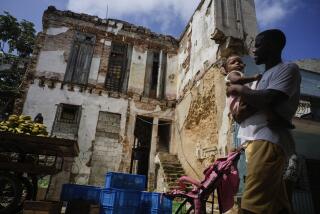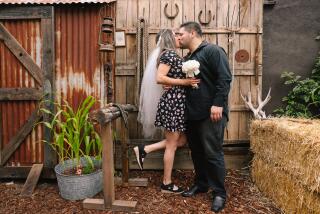Wedded Bliss Goes Amiss : Relationships: Getting married is easy in Cuba, but family pressures and a housing shortage make staying married difficult.
- Share via
HAVANA — Migdalia Echevarria and Michel Morales sat at a table surrounded by family and friends in the Rose Room of the elegant Palace of Weddings.
“Michel, do you take this woman?” asked Estanislao Garbay, an auxiliary registrar who has performed thousands of marriages in his 23 years at the palace in central Havana.
“Migdalia, do you take this man?”
A few minutes after Garbay pronounced them husband and wife, a couple who had been waiting in an adjoining room took their seats before him and another couple climbed the staircase to the top floor, where a registrar was ready to perform their marriage.
Outside, a polished black limousine, which like many of the vehicles in the capital predates the 1959 revolution that brought communism to this island nation, pulled up with yet another bride and groom.
“We are busy in the summer months,” said Patria Olano Navarrete, who has been the palace’s director since it was opened 24 years ago. “In August alone, we had over 400 weddings here.”
The palace is the oldest of dozens of state-run buildings throughout the country where couples can marry in style for anywhere from 30 to a few hundred pesos.
“They pay 30 pesos ($20) for a ceremony in one of the rooms of the palace, and they can contract for many other services, like the rental of a wedding gown, the photographer. We have facilities if they want to have a toast--even the ‘cake,’ ” she said, pronouncing the English word with Spanish intonation.
A wedding gown and veil rent for about 80 pesos ($60), a photographer runs about 40 to 100 pesos ($30 to $75), and the toast, with two beers and hors d’oeuvres for 40 guests, about 200 pesos ($153).
Most families, however, hold the wedding receptions in their homes. Echevarria’s and Morale’s was a simple affair held on the rooftop of their modest home in central Havana.
Olano said the Cuban government created the palaces to make a formal wedding ceremony accessible to average citizens.
Most were the homes of the rich and powerful before the revolution. The central Havana palace was a gambling casino.
Before 1959, common-law weddings were the norm, although some who could afford it were married in the church.
Unlike most other countries of Latin America, church weddings were never prevalent in Cuba, which has been strongly influenced by religious traditions brought by African slaves to the island.
Another unique aspect of marriage in Cuba is the reading of certain articles of the Family Code, a 1976 law governing family relations.
It mandates that both spouses bring up and educate their children “according to the principles of socialist morality,” participate “in the running of the home,” and states that each has “a right to practice their profession.”
Newlywed Osvaldo Rodriguez, 19, said he had no problem taking part in chores of the home, as he often did housework growing up. But he said, “a lot of times they read those words for nothing.”
“The words sound very nice, but they remain there on the paper. Men do not pay attention to them and that is why I will never get married again,” said a Cuban office worker who has been divorced three times.
In fact, Cuba’s divorce rate--3.4 per 1,000 inhabitants in 1988 and almost half the marriage rate of 7.9 per 1,000 inhabitants--is one of the highest in the world.
Sociologists cite several reasons: increased financial independence and responsibility of women in Cuban society; liberal divorce laws; machismo; lack of maturity on the part of spouses; even the attraction to younger members of the opposite sex.
But the major factor cited by almost everyone is Cuba’s severe housing shortage.
Palace registrar Garbay, who after so many years considers himself an expert on the subject, said: “They have to live with the family of one of the spouses. They often have different upbringings, they are immature and, on top of it, and they don’t have stability being in someone else’s home.”
A young Havana resident who asked to remain anonymous said his relationship deteriorated soon after his girlfriend moved in with his family.
“There were a lot of tensions between she and my family,” he said.
Cuban couples often flock to state-run posadas , or inns, where lovers can pay a small fee for a couple of hours of privacy. Like most things in Cuba, people line up for them, too.
More to Read
Sign up for Essential California
The most important California stories and recommendations in your inbox every morning.
You may occasionally receive promotional content from the Los Angeles Times.













